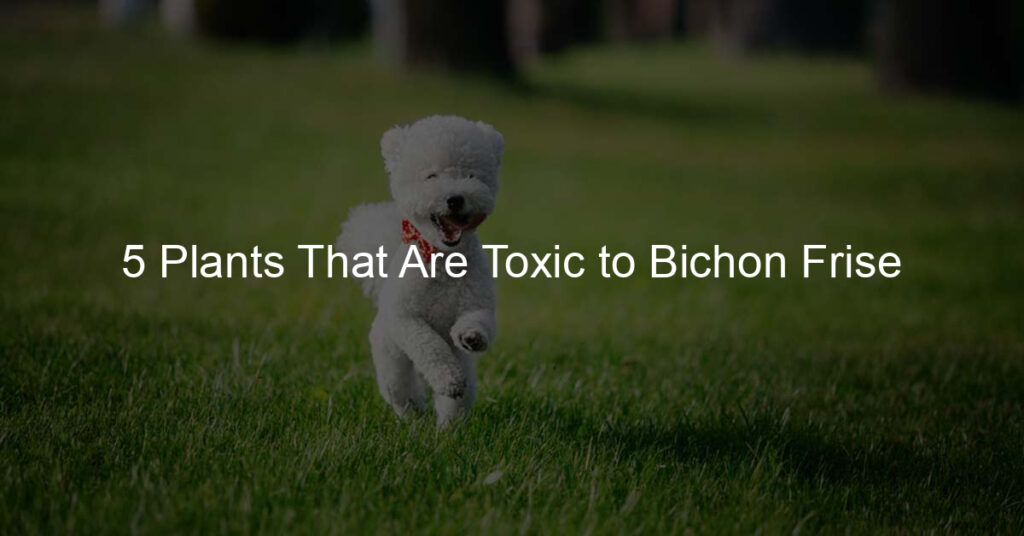Did you know that many common plants can be toxic to your Bichon Frise? While most plants are not poisonous, some can cause serious health problems for your furry friend. In this blog post, we’ll take a look at some of the 5 most common plants that are toxic to Bichons, as well as what symptoms to watch out for. Keep reading to learn more!
1. Sago Palm: The sago palm is a popular garden plant, but it can be quite toxic to dogs if ingested. Symptoms of ingestion include vomiting, diarrhea, lethargy, and even liver failure. If you notice any of these symptoms in your Bichon Frise, immediately contact your veterinarian for medical assistance.
2. Lilies: Lilies are known to be toxic to cats, but they can also be toxic to dogs, including Bichon Frises. Symptoms of ingestion include vomiting, depression, and loss of appetite. If your Bichon has ingested a lily, contact your veterinarian for treatment immediately.
3. Tulips and Daffodils: Both tulips and daffodils contain alkaloids, which can cause gastrointestinal upset in dogs if ingested. Symptoms of ingestion may include vomiting, diarrhea, and abdominal pain. If your Bichon has consumed any part of either of these plants, contact your veterinarian for treatment immediately.
4. Azaleas and Rhododendrons: Both azaleas and rhododendrons are considered toxic to dogs. Ingestion of either plant can cause vomiting, diarrhea, drooling, weakness, depression, and changes in heart rate. If your Bichon has ingested any part of either of these plants, seek immediate medical attention.
5. Foxglove: Foxglove is a popular garden plant, but it can be toxic if ingested by your Bichon Frise. Symptoms of ingestion may include vomiting, diarrhea, irregular heart rate, and even death. Seek immediate medical attention if you suspect your dog has ingested foxglove.
If you suspect that your Bichon Frise has ingested any of these plants, it is important to seek immediate medical attention. By being aware of what plants are toxic to dogs and keeping them away from your Bichon, you can help keep your pup safe and healthy!
Are any plants poisonous to dogs?
Dogs are our furry family members that we love and cherish dearly, so it’s important to know which plants may be poisonous to them. Unfortunately, many common houseplants can cause toxic effects to your pup if ingested. Some examples include lilies, oleander, azaleas, rubber plants, and narcissus bulbs.
Every dog owner should familiarize themselves with the list of potentially dangerous foliage for their four-legged friend’s safety to safely decorate their home. With an understanding of what is hazardous and what is okay, you can give your pup the best care possible!
Are any herbs toxic to dogs?
Many pet owners are unaware of the potential hazards associated with herbal remedies when it comes to their furry family members. While herbs can provide beneficial nutrition and health benefits for dogs, some varieties have the potential to be toxic if given in large doses or incorrectly administered. Common herbs such as aloe vera, ginseng, and garlic could be dangerous to your pup if you’re not careful.
However, the good news is that when used properly, many residential herbs offer healing effects for minor skin conditions and digestive issues. As always, it’s important to consult your veterinarian before administering any herbs as part of your pup’s regular care plan.
What are the worst plants for dogs?
When it comes to keeping houseplants at home, be aware that some plants can be dangerous for your canine companion. Everything from azaleas and rhododendrons to foxglove and cyclamen can be toxic for dogs and should be avoided. Even the seemingly innocent bouquets of daffodils and narcissus can cause serious health issues.
Ornamental grass, chrysanthemums, lilies, and oleander, if ingested by our furry friends, all come with serious side effects consisting of vomiting, diarrhea, heart problems, respiratory diseases, seizures, or – in worst cases – death. It is best to do research into which plants are safe for our pets before bringing any new house plants into the home.
What plants are not allowed for dogs?
It’s important to remember that not all plants are pet-friendly, especially when it comes to dogs. Toxic plants like foxglove, oleander, and yew are danger zones for our furry friends because they can cause them to become sick if they ingest any part of these plants.
It’s also important to mention that simple houseplants such as philodendron and dieffenbachia contain poisonous chemicals called oxalates which cause extreme sensitivity if consumed. To be on the safe side, it’s best to keep all plants out of reach of your dog so you can be sure your pup is healthy and happy!
Wrapping up: 5 Plants That Are Toxic to Bichon Frise
It’s understandable to be concerned about the safety of your precious Bichon Frise when it comes to plants. This list is, however, merely a guideline. Keep an eye out for any damage to your pet’s skin, eyes, and mouth should they come into contact with any unknown plants. If you notice any issues, be sure to seek veterinary help as soon as possible.
Lastly, don’t forget to schedule regular appointments with your vet or groomer so they can check your pet for external parasites or changes in skin condition. We hope that this article has provided you with helpful information about the plants toxic to Bichon Frise that you should look out for. This way, you can ensure both the health and well-being of your furry friend!








